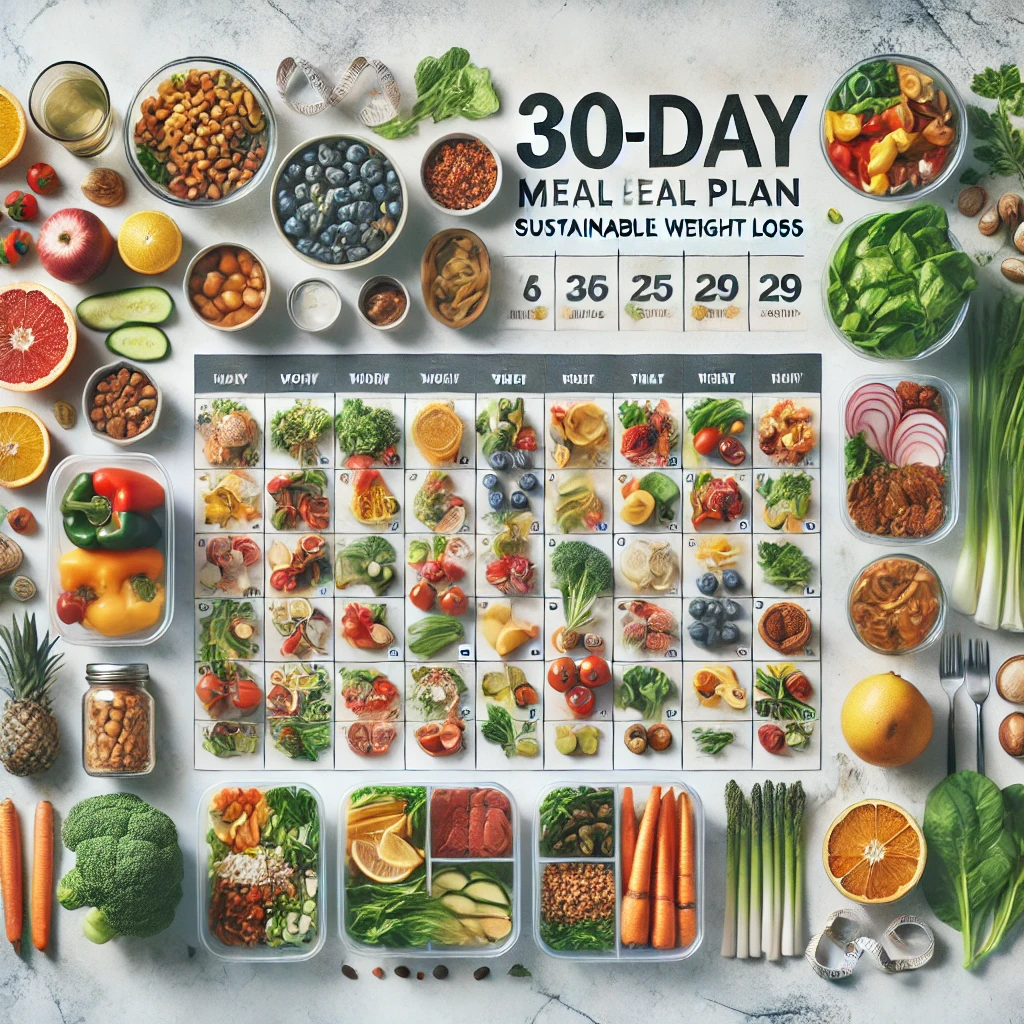
30-Day Meal Plan for Sustainable Weight Loss
Achieving sustainable weight loss isn't just about following the latest trends; it's about creating a lifestyle that balances fitness, nutrition, and mental well-being. In this article, we’ll walk you through a 30-day meal plan that not only supports weight loss but also helps improve your overall health. Whether you're a beginner looking for guidance or someone who’s been on the weight loss journey for a while, this plan is designed for you!
What Makes This Meal Plan Different?
Unlike typical crash diets, this meal plan focuses on sustainability. It emphasizes balanced eating, a mix of macronutrients, and integrates fitness routines and mental health tips. By combining these elements, the goal is to support long-term weight loss without compromising your health.
Building the Foundation: Healthy Eating Plans
1. The Importance of Balanced Meals
To lose weight sustainably, it’s crucial to eat a balanced diet. A good meal plan should include a mix of protein, healthy fats, and complex carbohydrates. This balance helps you feel full longer and prevents overeating.
2. Incorporating Nutrient-Dense Foods
Fruits, vegetables, whole grains, and lean proteins should be your go-to foods. They provide essential vitamins and minerals that not only support weight loss but also boost your overall wellness.
3. Hydration: The Unsung Hero
Don’t forget the importance of water! Hydration is key to weight loss and general health. Aim for at least 8 cups of water a day to keep your body functioning at its best.
Fitness Routines to Pair with Your Meal Plan
4. How to Create a Personalized Fitness Plan
Your fitness plan should be tailored to your goals. Whether you prefer cardio, strength training, or a combination of both, the key is consistency. Start with 30 minutes of moderate exercise, five times a week, and adjust as you progress.
5. Beginner’s Guide to Yoga for Weight Loss
If you're new to fitness, yoga is a fantastic way to get started. It not only helps you build strength and flexibility but also reduces stress, which is crucial for weight loss. Start with beginner poses like Downward Dog, Child’s Pose, and Cat-Cow.
6. Affordable Fitness Equipment
Not everyone has access to an expensive gym, but that doesn’t mean you can’t get in shape! Resistance bands, dumbbells, and kettlebells are affordable and versatile options for at-home workouts. Plus, they don’t take up much space!
Top Diet Trends for Weight Loss in 2025
7. Intermittent Fasting
Intermittent fasting has been gaining popularity for its potential to support fat loss and improve metabolic health. It involves cycling between periods of eating and fasting, which may help you reduce calorie intake and improve insulin sensitivity.
8. Plant-Based Diets
A plant-based diet focuses on whole foods, such as fruits, vegetables, legumes, and grains. It’s a heart-healthy option that’s low in calories and high in fiber—ideal for anyone trying to shed a few pounds.
9. The Keto Diet
The ketogenic diet, which focuses on low-carbohydrate, high-fat foods, has become a popular choice for those aiming to lose weight quickly. It puts your body into a state of ketosis, where it burns fat for energy.
Self-Care Strategies to Support Mental Health
10. Simple Meditation Practices
Meditation helps to reduce stress and improve mental clarity. Even a few minutes of mindfulness each day can help you stay focused and calm, making it easier to stick to your weight loss goals.
11. The Role of Sleep in Mental Health
Did you know that sleep and weight loss are connected? Poor sleep can increase hunger hormones and make it harder for your body to burn fat. Aim for 7-9 hours of quality sleep each night to support your mental health and weight loss goals.
12. Best Mindfulness Practices for Reducing Stress
Stress can lead to emotional eating, so it’s essential to manage it. Practices like deep breathing, progressive muscle relaxation, or journaling can help reduce stress and prevent weight gain caused by emotional triggers.
Wellness Trends 2025: The Future of Weight Loss
13. Personalized Nutrition
In 2025, personalized nutrition will play a huge role in sustainable weight loss. Genetic testing and microbiome analysis will help people identify which foods work best for their unique needs, making weight loss more effective than ever.
14. Wearable Fitness Technology
From smartwatches to fitness trackers, wearable tech is evolving rapidly. These devices monitor your heart rate, activity levels, and sleep patterns, providing valuable insights that can help you optimize your fitness routines.
15. Virtual Wellness Communities
More people are joining virtual wellness communities to stay motivated and share their fitness journeys. Whether it’s a fitness app or a social media group, these communities offer support, accountability, and encouragement.